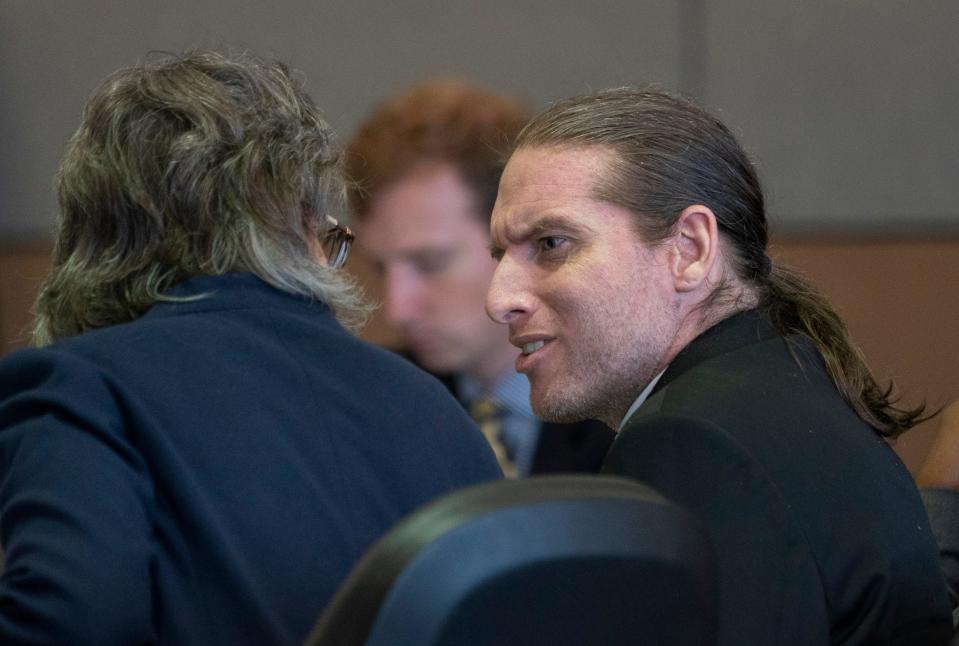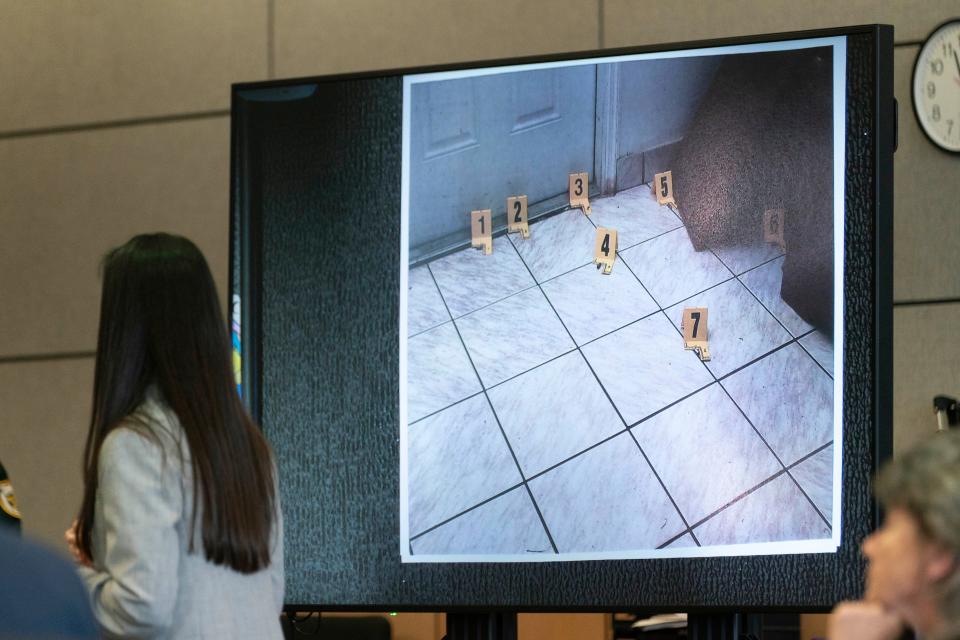Jury spares Jonathan Schuler from death penalty, sentencing him to life in prison for 2017 murder
WEST PALM BEACH — A 37-year-old former Boynton Beach-area man who went on a killing spree in 2017 was spared the death penalty on Friday for gunning down a Lake Worth Beach man in the doorway of his home that January.
After roughly two hours of deliberation following an emotional three-day hearing when Jonathan Schuler’s life was in the balance, the jury of six men and six women unanimously rejected the state’s contention that he deserved to be put to death.
Schuler, who interrupted the proceedings several times to complain that he didn’t want his struggles with mental illness to be exposed to the jury, smiled slightly and waved at his mother, who was sitting in the back of the courtroom.

Murder for hire: Jury finds husband guilty of first-degree murder in 2017 hired-gun killing of Makeva Jenkins
'We can bring justice to this family': West Palm police offer $40K reward in child's fatal shooting
Six dead near Delray Beach: PBSO: Teen recorded high-speed driving videos in weeks before fatal Delray-area crash
“I was hopeful,” said Cynthia Schuler, who had pleaded with the jury not to recommend that her son be sent to death row.
“Relieved,” the 65-year-old Oklahoma woman said, summing up her feelings about the jury’s decision.
Palm Beach County Circuit Judge Daliah Weiss immediately sentenced Schuler to life in prison. She ordered that his life term begin after he serves the 20-year sentence he was handed after being convicted of manslaughter in the February 2017 slaying of his landlord’s son.
The shooting death of Junior Petit-Bien figured prominently in the penalty phase of the trial.
However, jurors weren’t told that Schuler also faces a first-degree murder charge in Broward County, where he is accused of beating a co-worker to death with a crowbar at a Deerfield Beach construction site in March 2017. Broward prosecutors haven't said they intend to seek the death penalty.

Jonathan Schuler didn't want mental-health issues raised at sentencing
Jurors declined comment on their decision. In their verdict, they agreed with state prosecutors that Osterman’s killing was “cold, calculated and premeditated.” Testimony during the four-day trial showed Schuler shot the 49-year-old Osterman nine times as payback for abusing a woman Schuler had also dated.
Jurors also agreed that Schuler’s involvement in Petit-Bien’s death made him eligible for the death penalty.
But without detailing exactly what swayed them, jurors said they spared Schuler’s life because of the traumas and tragedies that punctuated his life.
During the penalty phase of the trial, which came after jurors on Monday convicted Schuler of first-degree murder, no one testified about the impact of Osterman’s death.
Assistant State Attorney Reid Scott said Osterman's mother was too emotionally distraught to come to court.

Members of Schuler’s large extended family, many of whom who live in Texas, described the sometime construction worker as a kind, loving and generous man who was haunted by his past. At times, they testified, he could become extremely paranoid, depressed and delusional.
However, even his mother admitted, she was unaware of the depths of Schuler’s struggles. And if Schuler had his way, neither she nor the jury would have found out.
“I don’t want any of my medical records to come out on the stand or in this court,” Schuler said on Wednesday before jurors came into the courtroom. “I’m not guilty, and all of this stuff is very prejudicial to my appeal. … My life is on the line here.”
He and Palm Beach County Public Defender Carey Haughwout talked privately and the hearing got underway. But on Thursday, when Haughwout called a psychologist to testify that Schuler suffered from schizoaffective disorder, he balked again.
“Carey, Carey,” he called out as Haughwout questioned psychologist Francis Crosby. “Let me talk to you.”
After the jury was told to leave the courtroom, Schuler again complained to Weiss that Haughwout was disregarding his wishes.
This time, he said the information about his admissions to psychiatric hospitals in Texas and West Palm Beach could impact his upcoming trial.
“Now she’s fouled up my other case in Broward by bringing up these mental-health issues,” Schuler said. “I told her not to talk about these things, especially not with an expert witness. She actually says she refuses to stop talking about it.”
Weiss again told Schuler that Haughwout and his other lawyers were trying to help him. She warned him against further outbursts, and he apologized.

Jurors heard of abuse, trauma that began when Schuler was young
During her closing arguments on Friday, an emotional Haughwout said she knew Schuler felt betrayed by her decision to focus attention on his mental illness.
But, she said, jurors needed to have the complete picture of Schuler’s life before they could decide if he deserved to die.
Haughwout and Assistant Public Defender Crystal Kim painted Schuler as a man who suffered devastating losses at a young age that contributed to his mental ills.
As a youngster, he was molested by a neighbor. Then, three of his beloved grandparents died within two years of each other. His older half-brother was diagnosed with muscular dystrophy when Schuler was 10.
The worst blow came when Schuler and his parents moved to Loxahatchee from Texas after Schuler’s father got a job as a broadcast engineer at Pax TV. The position promised to offer the struggling family the financial stability that had long eluded them. Three years after the move, Schuler’s father died from throat cancer at age 44.
Unable to cope with the loss of her husband, Schuler’s mother moved to Oklahoma, leaving her 19-year-old son behind.
Consumed with her own grief, she said she didn’t have the mental strength to help her son deal with his. “I feel like I failed him,” she tearfully told the jury.
Alone and unable to keep a job, Schuler was often homeless. He moved back to Texas several times to live with his sister and her family.

During 2012, he was hospitalized at various facilities in the Austin area for about a month after he called police, claiming he heard voices and was being followed by men in black.
Juan Vega, his sister’s former husband, remembered talking to Schuler in 2015 after he was released after a week-long stay at a psychiatric hospital because he had no insurance.
“He sounded very depressed. He was massively paranoid,” Vega testified. “He really thought people were after him. There was this tension and paranoia.”
When Schuler returned to West Palm Beach, problems persisted. He was hospitalized briefly in both 2012 and 2015, according to medical records.
Scott said Schuler’s mental problems were largely self-inflicted. Notes in some of the charts said Schuler suffered from “drug-induced psychosis” caused by a daily diet of methamphetamines, marijuana, crystal meth, cocaine and opioids, the prosecutor pointed out.
Citing Crosby’s testimony, Haughwout insisted that Schuler turned to illicit drugs to silence the flood of voices in his head.
“I can’t believe the state would stand up and demonize Jonathan for trying to treat himself,” she said.
In the end, she reminded jurors that their decision to convict Schuler on a charge of first-degree murder guaranteed that he would spend the rest of his life behind bars. Florida abolished parole decades ago.
Schuler didn’t deserve to die because he is haunted by demons he can’t control, Haughwout insisted.
“We don’t ask you to treat him gently or kindly. We just ask that you find Jonathan worthy of redemption,” she said. “I hope that Jonathan can overcome his challenges. I hope that Jonathan can live a productive life in prison.”
jmusgrave@pbpost.com
This article originally appeared on Palm Beach Post: Jonathan Schuler avoids death penalty for 2017 Lake Worth Beach murder

